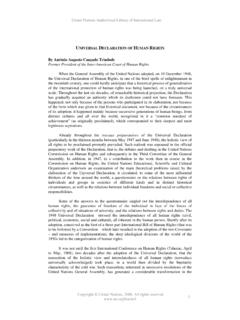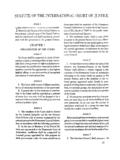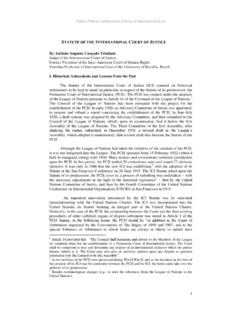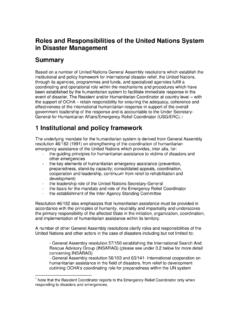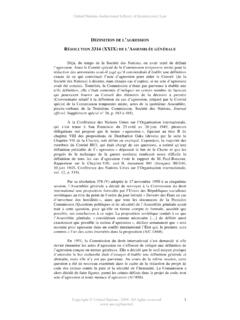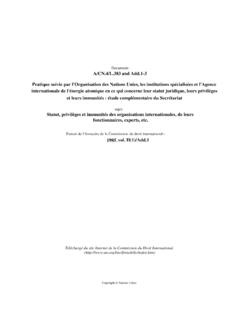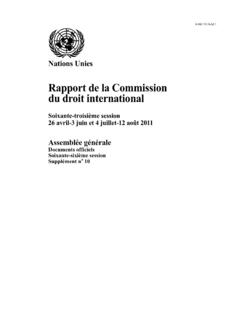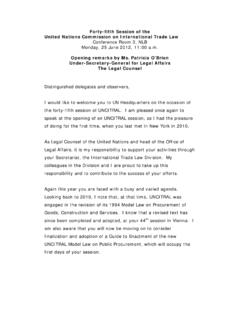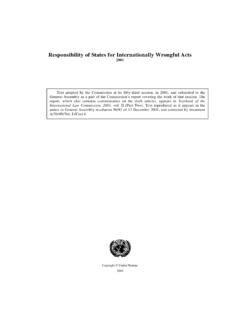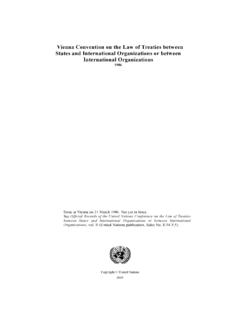Transcription of Draft Articles on the Law of Treaties with commentaries, 1966
1 Draft Articles on the Law of Treaties with commentaries 1966 Copyright United Nations 2005 Text adopted by the International Law Commission at its eighteenth session, in 1966, and submitted to the General Assembly as a part of the Commission s report covering the work of that session (at para. 38). The report, which also contains commentaries on the Draft Articles , appears in Yearbook of the International Law Commission, 1966, vol. II. Reports of the Commission to the General Assembly1875. Where an error is discovered in a certified copy ofa treaty, the depositary shall execute a proces-verbalspecifying the rectification and communicate a copy tothe contracting 75.
2 Registration and publication of treatiesTreaties entered into by parties to the present articlesshall as soon as possible be registered with the Secretariatof the United Nations. Their registration and publicationshall be governed by the regulations adopted by the GeneralAssembly of the United Articles on the law of Treaties with commentariesPart I. IntroductionArticle The scope of the present articlesThe present Articles relate to Treaties concluded (1) This provision defining the scope of the presentarticles as relating to " Treaties concluded between States"has to be read in close conjunction not only with arti-cle 2(l)(a), which states the meaning with which the term"treaty" is used in the Articles , but also with article 3,which contains a general reservation regarding certainother categories of international agreements.
3 The solebut important purpose of this provision is to underlineat the outset that all the Articles which follow have beenformulated with particular reference to Treaties concludedbetween States and are designed for application onlyto such Treaties .(2) Article 1 gives effect to and is the logical consequenceof the Commission's decision at its fourteenth sessionnot to include any special provisions dealing with thetreaties of international organizations and to confine thedraft Articles to Treaties concluded between concluded by international organizations havemany special characteristics; and the Commission con-sidered that it would both unduly complicate and delaythe drafting of the present Articles if it were to attemptto include in them satisfactory provisions concerningtreaties of international organizations.
4 It is true thatin the Draft provisionally adopted in 1962, article 1defined the term treaty "for the purpose of the presentarticles" as covering Treaties "concluded between twoor more States or other subjects of international law".It is also true that article 3 of that Draft contained avery general reference to the capacity of "other subjectsof international law" to conclude Treaties and a verygeneral rule concerning the capacity of internationalorganizations in particular. But no other article of thatdraft or of those provisionally adopted in 1963 and1964 made any specific reference to the Treaties of inter-national organizations or of any other "subject ofinternational law".
5 (3) The Commission, since the Draft Articles were beingprepared as a basis for a possible convention, con-sidered it essential, first, to remove from former Articles 1and 3 ( Articles 2 and 5 of the present Draft ) the provisionsrelating to Treaties not specifically the subject of thepresent Articles and, secondly, to indicate clearly therestriction of the present Articles to Treaties concludedbetween States. Accordingly, it decided to make theappropriate adjustments in Articles 1 and 5 and to insertarticle 1 restricting the scope of the Draft Articles totreaties concluded between States. The Commissionexamined whether the object could be more appropriatelyachieved by merely amending the definition of treatyin article 2.
6 But considerations of emphasis and of Draft -ing convenience led it to conclude that the definition ofthe scope of the Draft Articles in the first article is desirable.(4) The Commission considered it no less essential toprevent any misconception from arising from the expressrestriction of the Draft Articles to Treaties concludedbetween States or from the elimination of the referencesto Treaties of "other subjects of international law" andof "international organizations". It accordingly decidedto underline in the present commentary that the elimina-tion of those references is not to be understood as implyingany change of opinion on the part of the Commissionas to the legal nature of those forms of internationalagreements.
7 It further decided to add to article 3 (formerarticle 2) a specific reservation with respect to theirlegal force and the rules applicable to Use of terms1. For the purposes of the present Articles :(a) "Treaty" means an international agreement con-cluded between States in written form and governed byinternational law, whether embodied in a single instrumentor in two or more related instruments and whatever itsparticular designation.(b) "Ratification", "Acceptance", "Approval", and"Accession" mean in each case the international act sonamed whereby a State establishes on the internationalplane its consent to be bound by a treaty.(c) "Full powers" means a document emanating fromthe competent authority of a State designating a personto represent the State for negotiating, adopting or authen-ticating the text of a treaty, for expressing the consentof the State to be bound by a treaty, or for accomplishingany other act with respect to a treaty.
8 (d) "Reservation" means a unilateral statement, how-ever phrased or named, made by a State, when signing,ratifying, acceding to, accepting or approving a treaty,whereby it purports to exclude or to vary the legal effectof certain provisions of the treaty in their application tothat State.(e) "Negotiating State" means a State which took partin the drawing up and adoption of the text of the treaty.(/) "Contracting State" means a State which hasconsented to be bound by the treaty, whether or not thetreaty has entered into force.(g) "Party" means a State which has consented to bebound by the treaty and for which the treaty is in 1965 Draft , article 1962 and 1965 drafts, article of the International Law Commission, 1966, Vol.
9 II(h) "Third State" means a State not a party to thetreaty.(0 "International organization" means an intergovern-mental The provisions of paragraph 1 regarding the use ofterms in the present Articles are without prejudice to theuse of those terms or to the meanings which may be givento them in the internal law of any (1) This article, as its title and the introductory wordsof paragraph 1 indicate, is intended only to state themeanings with which terms are used in the Draft Articles .(2) "Treaty". The term "treaty" is used throughout thedraft Articles as a generic term covering all forms of inter-national agreement in writing concluded between the term "treaty" in one sense connotes onlythe single formal instrument, there also exist internationalagreements, such as exchanges of notes, which are nota single formal instrument, and yet are certainly agree-ments to which the law of Treaties applies.)
10 Similarly,very many single instruments in daily use, such as an"agreed minute" or a "memorandum of understanding",could not appropriately be called formal instruments,but they are undoubtedly international agreementssubject to the law of Treaties . A general convention onthe law of Treaties must cover all such agreements, andthe question whether, for the purpose of describingthem, the expression " Treaties " should be employed ratherthan "international agreements" is a question of termi-nology rather than of substance. In the opinion of theCommission a number of considerations point stronglyin favour of using the term "treaty" for this purpose.(3) First, the treaty in simplified form, far from beingat all exceptional, is very common, and its use is Secondly, the juridical differences, in sofar as they really exist at all, between formal treatiesand Treaties in simplified form lie almost exclusively inthe method of conclusion and entry into force.
